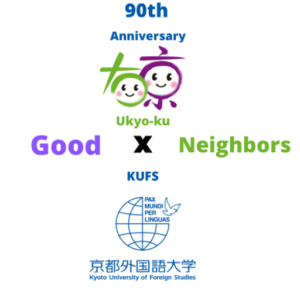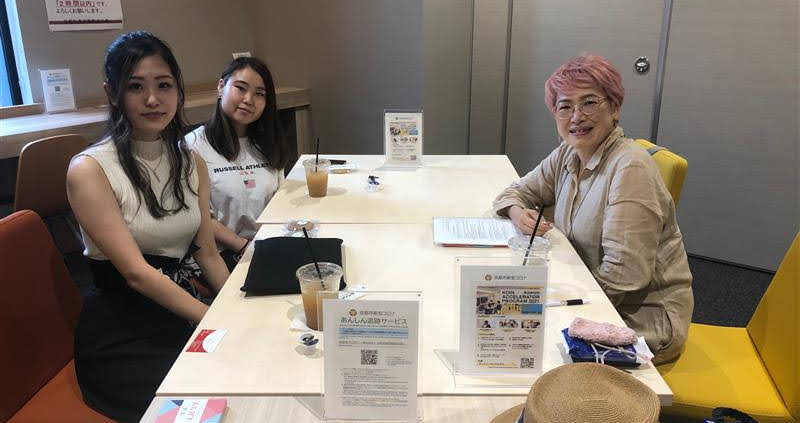[Living Histories] Ms. Miwa Satake
Interviewers/Authors: Hikaru Sasaki, Yuria Nishimura
Miwa Satake is the president of the Arashiyama-based marriage consulting firm KUON KYOTO. She works as a marriage counselor, working with couples before and after they get married. She started her career working for a counseling company based in Osaka that provided services in Osaka and Kyoto, but two years ago she started her own company and moved to Arashiyama. Over the past 12 years, she has counseled over 3,500 people and in the process over 750 couples have benefitted from her counseling. In February 2021, she participated as a guest speaker in the event called “Ukyo-style Jinsei Kaigi1”, as part of “Ukyo Kagayaki Mirai Kaigi2” a series of events organized by Ukyo Ward.
― Are you from Ukyo Ward? And if so, how long have you been living here?
Ms. Satake: I was born in the southern part of Osaka. After I got married, I came to Kyoto. Next year I will have lived in Ukyo Ward for 30 years.
― How long have you been working as a marriage counselor in Arashiyama, and could you explain the details of your work?
Ms. Satake: I have been working as a marriage counselor for 14 years. At first, I was an initial member of a venture company launched in Osaka by people who gathered from different industries. As the company grew, it added a Kyoto branch. Two years ago, I started a marriage consulting business in Arashiyama to create a new form of marriage counseling. In addition to the traditional “pre-marriage” counseling, we also provide people with chances to learn not only about marriage but also relationships. Hopefully, this enables them to live a happy life with their partner while living their own life in a rich and fulfilling way, especially in an aging society where people are expected to live for a long time. We offer various forms of advice and events, including workshops focusing on personal growth and the physical and mental differences between women and men, an event to take family photos, and even advice on smart divorce.
― What has been the hardest part of your career?
Ms. Satake: I have had a lot of hard times consulting about marriage. For example, it is difficult to counsel adolescents and young adults who are facing cancer. In addition, I have recently had more clients with disabilities and those who identify as LGBTQ+, but it is not easy to help them because Japan is lagging in dealing with diversity issues, compared to some countries. It is hard for society, including marriage counselors, to keep up with all the new information concerning these issues. When I fail to help them, I feel powerless, but I do think marriage counseling with couples facing such difficult situations is important. Even if things don’t work out, I try to build a relationship with them to think about their future together as much as possible.
― When do you feel most accomplished in your work?
Ms. Satake: Those who come for counseling have usually lost their self-confidence. During the sessions, when they discover their true self and realize they are already wonderful as a person, I feel very happy and usually hold their hands to share the discovery. I also feel a sense of accomplishment and joy when the couple gets married, maybe has a baby, and says to me, “I am happy today because I met you, Ms. Satake.”. That “thank you” is irreplaceable.
― Please tell me a little about the “Ukyo-style Jinsei Kaigi”. What did you talk about at the meeting?
Ms. Satake: In Ukyo-style Jinsei Kaigi, I gave a talk under the theme, “You can see how you are living now when you plan how you want to end your own life in your own way.” This talk was inspired by the fact that, in recent years, I have lost my father and mother-in-law, and as I look after my own daughter who has terminal cancer, I have come to think deeply about death. It seems to me that there is a strong belief that it is not a right thing to talk about one’s own end, even though everybody ends their own journey of life with death. According to a survey about 70% of people are unable to make their own decisions about treatment when they are near the end of their lives. A traditional Jinsei Kaigi is an effort to create opportunities to discuss and share thoughts with family members and health care practitioners about what kind of health care they want.
In Ukyo-style Jinsei Kaigi, I used a card game called “Moshibana Cards” to help participants discuss how they want to end their life and what they should do now in order to prepare for the end. I thought focusing on the “now” could make such a serious topic easier to discuss for anyone of different generations because they could look at their present life as if they were taking inventory of their lives. However, I was a little surprised that it didn’t resonate well with people in their 70s and 80s, whereas younger generations, such as university students and people in their 40s who were in their prime of life, seemed to be very keen.
Some people write “ending notes”, or a will, but once you create it, it is difficult to update. However, with Jinsei Kaigi, you can continue to update your notes, and if you use this card game, you can easily learn about how your loved one’s views about his or her life and death. I would be happy if Jinsei Kaigi and Moshibana Cards became more known because of this workshop.
― What kind of effect has the Corona pandemic had on your work?
Ms. Satake: It has been difficult for me to hold matchmaking sessions and events, so my work has been affected. I sometimes use Zoom but face to face is better as I think it is important for people to meet in person to develop a close relationship.
― What makes Ukyo Ward special compared to other wards in Kyoto?
Ms. Satake: Toei Kyoto Studio Park is special as there are many craftsmen working there, so I think the artistic aspect is special compared to other wards. TV and film production companies often come to Arashiyama to film various scenes for TV dramas and films. I think Arashiyama is another special place in the ward as it has become quite famous as a kind of “brand.”
― What do you like about Ukyo Ward?
Ms. Satake: It’s a place rich in nature. Now, I feel that the original beauty of Arashiyama has been restored as the number of tourists has decreased due to the influence of corona.
― Which historical or famous place in Ukyo Ward do you think others find most interesting or special?
Ms. Satake: I think Tenryuji Temple is one of the most interesting places in the ward. The temple has a beautiful garden, and every time my friends come to Kyoto, I take them there.
― What is your favorite place in Ukyo Ward?
Ms. Satake: I like Hirosawanoike Pond near Daikakuji Temple. There are no buildings or electric poles on one side of the pond, and it looks like a scene of Japan from many years ago. It is very beautiful when the surface of the pond looks like a mirror. It is a beautiful place in each of the four seasons, and it is my favorite place because it closely resembles the scenery of my hometown.
― Is there anything you want to change or improve about Ukyo Ward?
Ms. Satake: I think the community of Ukyo Ward needs to make some changes in order to give off a better impression. I live in Ukyo Ward, and I feel that many people here are relatively conservative and don’t like changes very much. We need more attractive or fashionable places unique to the ward to make the residents prouder of their home. There are also many vacant houses in Ukyo Ward, and I think we could create a program that makes some of these houses available for artistic people to use and revitalize the community. It’s a good idea to encourage young people to promote Ukyo Ward.
― Do you know anything about Kyoto University of Foreign Studies or Kyoto Gaidai Nishi High School? Is there anything you want to know?
Ms. Satake: For Kyoto Gaidai Nishi High School, I have an impression that it is a school strong in sports. Kyoto University of Foreign Studies has Morita Memorial Hall, which I always find beautiful when I walk down the street in front of school. I also have an impression that it is a small university but lively. I would like to know if the university offers classes for the general public.
― How would you describe Ukyo Ward in one sentence?
Ms. Satake: “The area has a lot of potential for growth.”
Note
- Jinsei Kaigi (literally translated into “life meeting”), also known as “advance care planning,” is a conversation with family members and others that take care of you to discuss in advance the kind of medical care and assistance you want to receive at the end of your life.
- Ukyo Kagayaki Mirai Kaigi was a series of three events held in 2019 and 2020 to provide opportunities to Ukyo Ward residents to get together and talk about the future of the ward.



